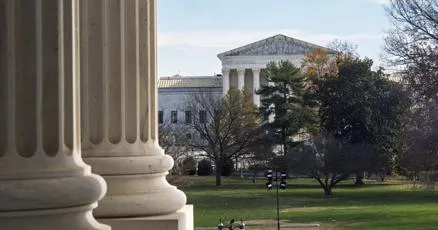By MARK SHERMAN - Associated Press
WASHINGTON (AP) -- Hearing a high-profile culture-war clash, a majority of the Supreme Court seemed reluctant Wednesday to block Tennessee's ban on gender-affirming care for minors.
The justices' decision, not expected for several months, could affect similar laws enacted by another 25 states and a range of other efforts to regulate the lives of transgender people, including which sports competitions they can join and which bathrooms they can use.
The case is coming before a conservative-dominated court after a presidential election in which Donald Trump and his allies promised to roll back protections for transgender people.
"The Constitution leaves that question to the people's representatives, rather than to nine people, none of whom is a doctor," Roberts said in an exchange with ACLU lawyer Chase Strangio.
The court's three liberal justices seem firmly on the side of the challengers. But it's not clear that any of the court's six conservatives will go along. Justice Neil Gorsuch, who wrote the majority opinion in 2020, has yet to say anything.
There were dueling rallies outside the court in the hours before the arguments. Speeches and music filled the air on the sidewalk below the court's marble steps. Advocates of the ban bore signs like "Champion God's Design" and "Kids Health Matters," while others proclaimed "Fight like a Mother for Trans Rights" and "Freedom to be Ourselves."
"That is sex discrimination," Solicitor General Elizabeth Prelogar wrote in her main court filing.
Tennessee's law bans puberty blockers and hormone treatments for transgender minors but allows these treatments for other reasons. The state argues it acted to protect minors from risks associated with gender-transition procedures.
"The law draws a line between minors seeking drugs for gender transition and minors seeking drugs for other medical purposes. And boys and girls fall on both sides of that line," Tennessee Attorney General Jonathan Skrmetti wrote in the state's Supreme Court brief.
If heightened scrutiny is applied by justices, they could return it to appeals courts for further examination under this standard.
Brian Williams said that as a result of puberty blockers and hormone treatments, his transgender daughter L.W., is planning her future despite needing out-of-state travel due to Tennessee’s ban: "We know what is right for her."
